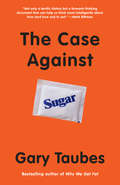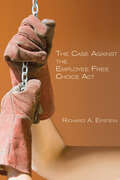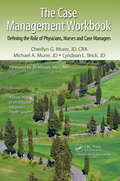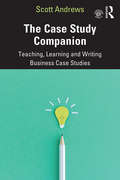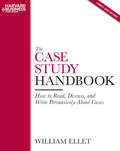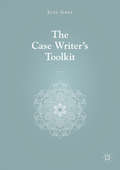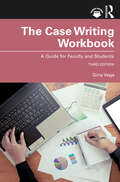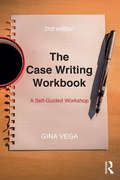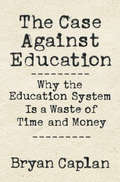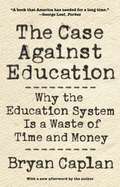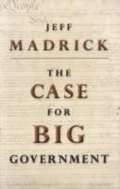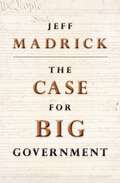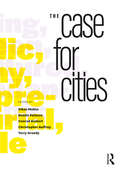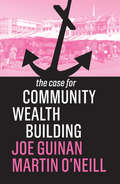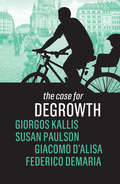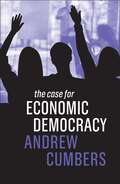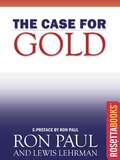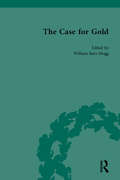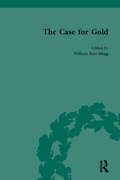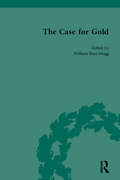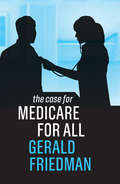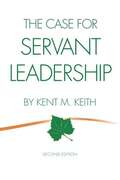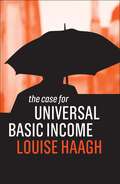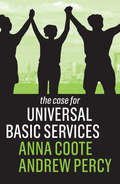- Table View
- List View
The Case Against Sugar
by Gary TaubesFrom the best-selling author of Why We Get Fat, a groundbreaking, eye-opening exposé that makes the convincing case that sugar is the tobacco of the new millennium: backed by powerful lobbies, entrenched in our lives, and making us very sick. Among Americans, diabetes is more prevalent today than ever; obesity is at epidemic proportions; nearly 10% of children are thought to have nonalcoholic fatty liver disease. And sugar is at the root of these, and other, critical society-wide, health-related problems. With his signature command of both science and straight talk, Gary Taubes delves into Americans' history with sugar: its uses as a preservative, as an additive in cigarettes, the contemporary overuse of high-fructose corn syrup. He explains what research has shown about our addiction to sweets. He clarifies the arguments against sugar, corrects misconceptions about the relationship between sugar and weight loss; and provides the perspective necessary to make informed decisions about sugar as individuals and as a society.
The Case Against the Employee Free Choice Act
by Richard A. EpsteinWith the Obama administration in the White House and an overwhelmingly Democratic Congress, passage of the Employee Free Choice Act (EFCA) appears likely. But it can and should be stopped if at all possible, given the adverse impact that it will have on the workplace and the overall economy. In The Case against the Employee Free Choice Act, Richard Epstein examines this proposed legislation and why it is a large step backward in labor relations that will work to the detriment of employees, employers, and the public at large.
The Case Management Workbook: Defining the Role of Physicians, Nurses and Case Managers
by Cherilyn G. Murer Michael A. Murer Lyndean L. BrickThis workbook reflects a number of important regulatory changes that have occurred in the past 13 years, as well as the new landscape of healthcare reform. It serves as an important resource for case managers, administrators, physicians and others who play a role in the case management process.
The Case Study Companion: Teaching, Learning and Writing Business Case Studies
by Scott AndrewsThe Case Study method of teaching and learning, adopted by business schools and management centres globally, provides an important function in management education, but employing it effectively can often be a challenge. This book provides practical insights, tools and approaches for both case teaching and writing, drawing on perspectives from expert practitioners around the world. This book aims to critically examine different approaches to using case studies in group-based, participant-centred learning environments, exploring good practices for case teaching and learning. It provides guidance for case writers on various approaches to structuring case data, presentational formats, and the use of technology in the construction of different types of cases. It also demonstrates the use of the case method as a tool for assessment, supporting students’ own development of cases to showcase good practice in organisations. The final section of this book showcases some of the resources available, providing links and reviews of additional material that can support future case teaching and writing practice, including publication. The Case Study Companion is designed for lecturers using cases within their teaching across all management disciplines, as well as those training for Professional Development and Management Education qualifications. It will also be useful for postgraduate, MBA and Executive Education students wanting to make the most of case studies in their learning and assessments.
The Case Study Handbook
by William ElletIf you're enrolled in an executive education or MBA program, you've probably encountered a powerful learning tool: the business case. But if you're like many people, you may find interpreting and writing about cases mystifying, challenging, or downright frustrating. In "The Case Study Handbook", William Ellet presents a potent new approach for analyzing, discussing, and writing about cases. Early chapters show how to classify cases according to the analytical task they require (solving a problem, making a decision, or forming an evaluation) and quickly establish a base of knowledge about a case. Strategies and templates, in addition to several sample Harvard Business School cases, help you apply the author's framework. Later in the book, Ellet shows how to write persuasive case-analytical essays based on the process laid out earlier. Extensive examples of effective and ineffective writing further reinforce your learning. The book also includes a chapter on how to talk about cases more effectively in class. Any current or prospective MBA or executive education student needs to read this book.
The Case Writer’s Toolkit
by June GweeThis book deconstructs the case study, describes the case writing process and explains how a good case study is composed. It is a reference book that accompanies case writers on their case writing journey. It serves as a guide for writers to develop case studies for teaching, research, and knowledge-capture. There are illustrations and charts to help writers visualise concepts, signpost ideas, break down complex information and apply techniques in a practical manner.
The Case Writing Workbook: A Guide for Faculty and Students
by Gina VegaThis case writing workbook offers something unique in the world of case writing manuals. The third edition of The Case Writing Workbook: A Guide for Faculty and Students provides 11 standalone chapters that focus specifically on challenges related to the case writing process. The book is meant for day-to-day use as a model of the case writing process, with exercises, worksheets, and training activities that will guide you through the entire course of writing both a traditional case and Instructor’s Manual or a concise/short case and its associated Teaching Note. Brief explanatory notes will lead you step-by-step through all the developmental exercises, including readying the case for publication and teaching it in the classroom or online. Designed as an individualized workshop to assist case authors to structure their writing, this book combines the easy-to-understand, student-focused language with new material covering the latest developments and challenges in the world of case writing. These include: • A fresh focus on writing and teaching concise cases, which are particularly suited to the world of blended learning. • Emphasis on secondary research methodology, particularly using digital technologies and social media. • A new case study running throughout the book, with restructured worksheets and notes to support it. • Enhanced online case teaching information and discussion of the development of multi-media cases, particularly using video. Complete instructor’s materials to support the text are available online, including PowerPoint presentations, guidance on embedding cases within the curriculum, a sample syllabus that incorporates cases within it, and selected student assignments and handouts. Finishing all the book’s assignments will result in a complete case and Instructor’s Manual that can be tested in the classroom and submitted to a conference or journal. The Case Writing Workbook is a must for the shelf of any academic or student conducting qualitative research and looking to enhance their skill set, and any instructor working with cases in their teaching.
The Case Writing Workbook: A Self-Guided Workshop
by Gina VegaThis book offers a modular set of chapters that focus specifically on the challenges related to case writing. Exercises, worksheets, and training activities help guide readers sequentially through the entire process of writing both a case and an instructor’s manual (teaching note). Designed as an individualized workshop to assist case authors to structure their writing, this book combines the easy-to-understand, student-focused language of the first edition with new material covering the latest developments and challenges in the world of case writing. These include: ? A section on writing cases in condensed time frames ? A new module on writing short cases in various formats ? A new module on turning research papers into teaching tools ? A section about growing communities of practice in a university ? An expansion of the student case writing module to include a section on case writing for graduate students ? Twelve new worksheets ? A complete index to facilitate use of the book Finishing all the book’s assignments will result in a complete case and instructor’s manual that can be tested in the classroom and submitted to a conference or journal. The Case Writing Workbook is a must for the shelf of any academic or student conducting qualitative research and looking to enhance their skill set.
The Case against Education: Why the Education System Is a Waste of Time and Money
by Bryan CaplanWhy we need to stop wasting public funds on educationDespite being immensely popular--and immensely lucrative—education is grossly overrated. In this explosive book, Bryan Caplan argues that the primary function of education is not to enhance students' skill but to certify their intelligence, work ethic, and conformity—in other words, to signal the qualities of a good employee. Learn why students hunt for easy As and casually forget most of what they learn after the final exam, why decades of growing access to education have not resulted in better jobs for the average worker but instead in runaway credential inflation, how employers reward workers for costly schooling they rarely if ever use, and why cutting education spending is the best remedy.Caplan draws on the latest social science to show how the labor market values grades over knowledge, and why the more education your rivals have, the more you need to impress employers. He explains why graduation is our society's top conformity signal, and why even the most useless degrees can certify employability. He advocates two major policy responses. The first is educational austerity. Government needs to sharply cut education funding to curb this wasteful rat race. The second is more vocational education, because practical skills are more socially valuable than teaching students how to outshine their peers.Romantic notions about education being "good for the soul" must yield to careful research and common sense—The Case against Education points the way.
The Case against Education: Why the Education System Is a Waste of Time and Money
by Bryan CaplanWhy we need to stop wasting public funds on educationDespite being immensely popular—and immensely lucrative—education is grossly overrated. Now with a new afterword by Bryan Caplan, this explosive book argues that the primary function of education is not to enhance students' skills but to signal the qualities of a good employee. Learn why students hunt for easy As only to forget most of what they learn after the final exam, why decades of growing access to education have not resulted in better jobs for average workers, how employers reward workers for costly schooling they rarely ever use, and why cutting education spending is the best remedy. Romantic notions about education being "good for the soul" must yield to careful research and common sense—The Case against Education points the way.
The Case for Big Goverment
by Jeff MadrickPolitical conservatives have long believed that the best government is a small government. But if this were true, noted economist Jeff Madrick argues, the nation would not be experiencing stagnant wages, rising health care costs, increasing unemployment, and concentrations of wealth for a narrow elite. In this perceptive and eye-opening book, Madrick proves that an engaged government- a big government of high taxes and wise regulations- is necessary for the social and economic answers that Americans desperately need in changing times. He shows that the big governments of past eras fostered greatness and prosperity, while weak, laissez-faire governments marked periods of corruption and exploitation. The Case for Big Government considers whether the government can adjust its current policies and set the country right. Madrick explains why politics and economics should go hand in hand; why America benefits when the government actively nourishes economic growth; and why America must reject free market orthodoxy and adopt ambitious government-centered programs. He looks critically at today's politicians- Republicans seeking to revive nineteenth-century principles, and at Democrats who are abandoning the pioneering efforts of the Great Society. Madrick paints a devastating portrait of the nation's declining social opportunities and how the economy has failed its workers. He demonstrates that the government must correct itself to address these serious issues.
The Case for Big Government (The Public Square #9)
by Jeff MadrickPolitical conservatives have long believed that the best government is a small government. But if this were true, noted economist Jeff Madrick argues, the nation would not be experiencing stagnant wages, rising health care costs, increasing unemployment, and concentrations of wealth for a narrow elite. In this perceptive and eye-opening book, Madrick proves that an engaged government--a big government of high taxes and wise regulations--is necessary for the social and economic answers that Americans desperately need in changing times. He shows that the big governments of past eras fostered greatness and prosperity, while weak, laissez-faire governments marked periods of corruption and exploitation. The Case for Big Government considers whether the government can adjust its current policies and set the country right. Madrick explains why politics and economics should go hand in hand; why America benefits when the government actively nourishes economic growth; and why America must reject free market orthodoxy and adopt ambitious government-centered programs. He looks critically at today's politicians--at Republicans seeking to revive nineteenth-century principles, and at Democrats who are abandoning the pioneering efforts of the Great Society. Madrick paints a devastating portrait of the nation's declining social opportunities and how the economy has failed its workers. He looks critically at today's politicians and demonstrates that the government must correct itself to address these serious issues. A practical call to arms, The Case for Big Government asks for innovation, experimentation, and a willingness to fail. The book sets aside ideology and proposes bold steps to ensure the nation's vitality.
The Case for Cities
by Danilo Palazzo Vikas Mehta Conrad Kickert Christopher Auffrey Terry GrundyThe fateful year 2020 brought dramatic challenges to American cities. The COVID-19 pandemic and the civil unrest caused by the killing of George Floyd led to a cascade of negative media stories about cities, often politically motivated. It seemed possible that the economic and demographic gains cities had achieved over the last few decades could be lost. In fact, there has been measurable population loss in larger cities caused by changing work/life patterns and changing public perceptions about the costs and benefits of urban living. Faced with these challenges, advocates for cities must make a vigorous case for cities and show how they aren’t the cause of America’s social, environmental, economic, and public health problems but, in fact, are the places where the solutions to those problems will be found. The 38 chapters in The Case for Cities draw on the expertise of contributors from the academic, professional, and civic sectors to explore the creative tension between the two great values on which the vigor of cities depends––that they should be "Cities of Choice" (places where people who have choice want to live) and "Cities of Justice" (places that welcome and support people with limited choices). The book’s underlying perspective is that these two values are symbiotic and that promoting both is what leads to viable, sustainable urban resurgence. This book will be of keen interest to students and practitioners in urban planning, urban design, real estate, architecture, and landscape architecture and to urban advocates and civic leaders.
The Case for Community Wealth Building (The Case For #2)
by Martin O'Neill Joe GuinanOur broken economic model drives inequality and disempowerment, lining the pockets of corporations while extracting wealth from local communities. How can we reverse this? Joe Guinan and Martin O’Neill argue for an approach that uses the power of democratic participation to drive equitable development and ensure that wealth is widely shared. They show how this model – Community Wealth Building – can transform our economic system by creating a web of collaborative institutions, from worker cooperatives to community land trusts and public banks, that empower and enrich the many, not the few. This book is essential reading for everyone interested in building more equal, inclusive, and democratic societies.
The Case for Degrowth
by Susan Paulson Giacomo D'Alisa Federico Demaria Giorgos KallisThe relentless pursuit of economic growth is the defining characteristic of contemporary societies. Yet it benefits few and demands monstrous social and ecological sacrifice. Is there a viable alternative? How can we halt the endless quest to grow global production and consumption and instead secure socio-ecological conditions that support lives worth living for all? In this compelling book, leading experts Giorgos Kallis, Susan Paulson, Giacomo D’Alisa and Federico Demaria make the case for degrowth - living well with less, by living differently, prioritizing wellbeing, equity and sustainability. Drawing on emerging initiatives and enduring traditions around the world, they advance a radical degrowth vision and outline policies to shape work and care, income and investment that avoid exploitative and unsustainable practices. Degrowth, they argue, can be achieved through transformative strategies that allow societies to slow down by design, not disaster. Essential reading for all concerned citizens, policy-makers, and students, this book will be an important contribution to one of the thorniest and most pressing debates of our era.
The Case for Economic Democracy (The Case For)
by Andrew CumbersThe idea that the people have a right to shape political decisions through democratic means is widely accepted. The same cannot be said of the decisions that impact on our everyday economic life in the workplace and beyond. Andrew Cumbers shows why this is wrong, and why, in the context of the rising tide of populism and the perceived crisis of liberal democracy, economic democracy's time has come. Four decades of market deregulation, financialisation, economic crisis and austerity has meant a loss of economic control and security for the majority of the world's population. The solution must involve allowing people to 'take back control' of their economic lives. Cumbers goes beyond older traditions of economic democracy to develop an ambitious new framework that includes a traditional concern with workplace rights and collective bargaining, but shifts the focus to include consideration of individual economic rights and processes of public engagement and deliberation beyond the workplace. This topical and original book will be essential reading for anyone interested in radical solutions for our economic and political crises.
The Case for Gold
by Ron PaulIn 1982, Ron Paul served on the U.S. Gold Commission to evaluate the role of gold in the monetary system. In fact, the Commission was his idea. It was carrying forth a promise made in the Republican platform. Ron couldn't pick the members, so from the beginning, the deck was stacked. The majority was dominated by monetarists, who saw gold as too scarce and paper as just fine. Ron Paul's team was ready, however, with this marvelous minority report. Rarely has a dissent on a government commission done so much good! The result was The Case for Gold, and it was the greatest result of the commission. It covers the history of gold in the United States, explains that its breakdown was caused by governments, and explains the merit of having sound money: prices reflect market realities, government stays in check, and the people retain their freedom. The scholarship and rigor impressed even the critics of the minority. Ron and Lewis Lehrman worked with a team of economists that included Murray Rothbard, so it is hardly suprising that such a book would result. It still holds up as an excellent blueprint for moving beyond paper money and into the age of sound money. In particular, Ron favors complete monetary freedom to use any commodity as money, to make contracts in any money, and an end to the monopolization and printing power of the Federal Reserve. There is a strong piece of history in this book. Not since the 19th century has a political figure made such a sweeping and devastating case for radical monetary reform. This congressman ran circles around even the experts at the Fed. A dazzling performance indeed, and an inspiring and learned book.
The Case for Gold Vol 1
by William Rees-MoggThe role of gold in the world's exchange system has been hotly contested by leading economists. This work collects the most important arguments in favour of gold, including such works as David Ricardo's "High price of Bullion" and W. Stanley Jevons's "Money and the Mechanism of Exchange".
The Case for Gold Vol 2
by William Rees-MoggThe role of gold in the world's exchange system has been hotly contested by leading economists. This work collects the most important arguments in favour of gold, including such works as David Ricardo's "High price of Bullion" and W. Stanley Jevons's "Money and the Mechanism of Exchange".
The Case for Gold Vol 3
by William Rees-MoggThe role of gold in the world's exchange system has been hotly contested by leading economists. This work collects the most important arguments in favour of gold, including such works as David Ricardo's "High price of Bullion" and W. Stanley Jevons's "Money and the Mechanism of Exchange".
The Case for ISO 27001
by Alan CalderHere, at last, is a book by a business manager who knows what makes a business work and why best practice information security is essential. Written in clear English, this book explains why so many organizations have already successfully registered to BS7799/ISO27001 and makes a crystal clear case for pursuing the standard that management in any organization anywhere in the world will accept. Information security is about more, so much more than compliance, security and survival - it's about sharpening your competitive edge for battle in the information economy. Alan Calder, the author of "IT Governance: a Manager's Guide to Data Protection and BS7799/ISO17799," led one of the first successful BS7799 certification efforts in the world. He also belongs to the committee of experts of a global certification body. This book sets out why ISO 27001 is the right answer to the information security challenge.
The Case for Medicare for All (The Case For)
by Gerald FriedmanLargely privately funded with relatively little public regulation, the United States healthcare system is both expensive and inefficient, providing poor care to large parts of the population. For decades, Americans have wrestled with how to fix their broken healthcare system. In this razor-sharp contribution to the healthcare debate, leading economist and former adviser to Bernie Sanders Gerald Friedman recommends that we build on what works: a Medicare system that already efficiently provides healthcare for millions of Americans. Rejecting the discredited idea that healthcare should be treated like any other commodity, Friedman shows that healthcare is distinctive and can be best provided only through universal program of social insurance. Deftly exposing the absurdities of the opponents of reform, Friedman shows in detail how the solution to our health care crisis is staring us in the face: enroll everyone in Medicare to improve the health of all Americans. This bold and brilliantly argued book is essential reading for anyone who wants to see Congress and the White House act to provide America with a 21st century healthcare system.
The Case for Servant Leadership
by Kent M. KeithThis book is an introduction to servant leadership. The author argues that servant leadership is ethical, practical, and meaningful. He cites the universal importance of service, defines servant leadership, compares the power model of leadership with the service model, describes some key practices of servant-leaders, explores the meaningful lives of servant-leaders, and offers questions for reflection and discussion. <p><p>The new second edition of the book provides additional quotations and examples; summaries of scholarly definitions of servant leadership and research on the impacts of servant leadership in the workplace; an appendix on servant leadership compared with other ideas or theories of leadership; and a list of sources for those who wish to explore servant leadership further.
The Case for Universal Basic Income
by Louise HaaghAdvocated (and attacked) by commentators across the political spectrum, paying every citizen a basic income regardless of their circumstances sounds utopian. However, as our economies are transformed and welfare states feel the strain, it has become a hotly debated issue. In this compelling book, Louise Haagh, one of the world’s leading experts on basic income, argues that Universal Basic Income is essential to freedom, human development and democracy in the twenty-first century. She shows that, far from being a silver bullet that will transform or replace capitalism, or a sticking plaster that will extend it, it is a crucial element in a much broader task of constructing a democratic society that will promote social equality and humanist justice. She uses her unrivalled knowledge of the existing research to unearth key issues in design and implementation in a range of different contexts across the globe, highlighting the potential and pitfalls at a time of crisis in governing and public austerity. This book will be essential reading for anyone who wants to get beyond the hype and properly understand one of the most important issues facing politics, economics and social policy today.
The Case for Universal Basic Services (The Case For)
by Anna Coote Andrew PercyThe idea that healthcare and education should be provided as universal public services to all who need them is widely accepted. But why leave it there? Why not expand it to more of life’s essentials? In their bold new book, Anna Coote and Andrew Percy argue that this transformational new policy – Universal Basic Services – is exactly what we need to save our societies and our planet. The old argument that free markets and individual choice are the best way to solve pressing problems of poverty, inequality and environmental degradation has led us to catastrophe, and must be abandoned. The authors show that expanding the principle of collective universal service provision to everyday essentials like transport, childcare and housing is not only the best way of tackling many of the biggest problems facing the contemporary world: it’s also efficient, practical and affordable.Anyone who cares about fighting for a fairer, greener and more democratic world should read this book.
